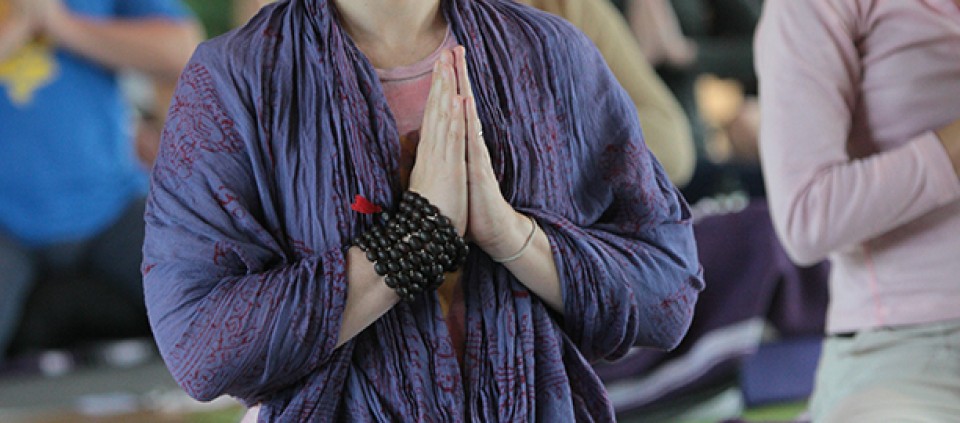Trusting in Moderation

by Cheryl Kain
When I hear the word “moderation,” my thoughts go immediately to diet and exercise. As a recovering perfectionist who is vigilantly seeking new paths to loving-kindness and self-acceptance, I notice that extreme agendas can creep into relationships, work, and even leisure time—and there’s perhaps nowhere that’s more true than in the weight-loss arena.
In my search for balance and compassion, I’ve found that extreme dieting feels harsh, painful, and non-sustainable. But moderation, as opposed to restriction or indulgence, can relate to self-care in all forms, as well as setting healthy boundaries with people. I feel that, in the long haul, practicing moderation is the only lasting way.
Moderation is Type A’s introverted cousin, a journey into the subtle landscape of gray. Finding neutral is not always easy, but I’m convinced that it can lead to happiness. I want to trust myself so deeply that I don’t doubt what I need, and don’t second-guess that I’ll find my way through, whether I’m dealing with conflict, my daily food plan, my time frame in communicating, or how I think my body should look.
I asked Annie B. Kay, an integrative dietitian and Kripalu’s Lead Nutritionist, how moderation might inform goal-setting—such as for weight loss.
“I personally have been a huge goal setter, and I think goals around being moderate are a beautiful thing,” Annie says. “For me, moderation is, on most days, I eat vegetables, beans, nuts, and a little bit of fish. But when I go out on the weekend with my husband, I don’t have a cascade of craziness around having a piece of bread.” If you set a goal that doesn’t feel achievable, Annie says, adjust it so that it’s feasible for you.
Annie adds, “It’s our nature to be compulsive. There’s nothing wrong with that. We all have a higher consciousness, so let’s cultivate that, too. Can we practice self-love deeply enough to be really kind to ourselves but also to keep ourselves to our internal agreements?“
Instead of judging my occasional compulsivity, I feel encouraged to practice compassionate self-observation, and just notice what’s going on. When I’m able to choose this course, the cravings, judgments, and fear seem to pass more quickly.
And, I’ve learned to love exercise. A walk on the beach, a cycle through the woods, swimming, dancing, and my daily yoga practice all open up space in my body, heart, and head for new behaviors. The euphoria after a generous dose of nature, cardio, or meditative practice can stay with me all day long.
So, during the past six months, when I found myself dance-avoidant and reluctant to attend my beloved biweekly yoga class, I worried—and yes, I judged myself. It was true that lower-than-average winter temperatures left me wanting to hibernate more and move less. Instead of committing to a daily hour of movement, I’d walk for 20 minutes. In my mind, it just wasn’t enough. Frustrated that I’d hit a bump in the road, my mind began to spiral down that familiar, frantic rabbit hole. Finally, I let go of the relentless inner chatter and decided that I would love the situation just as it is, and accept myself, just the way I am.
Aruni Nan Futuronsky, Life Coach and Kripalu faculty member, uses the mantra, “And I am worthy, anyway.” I find this to be a sweet balm when my inner critic wants to point out a mistake I’ve made or some way in which I haven’t measured up. “The solution to all my challenges today rests in accepting how I’m showing up,” Aruni says. “When I’m practicing this, life flows. When I attach myself to self-judgment and criticism, I’m stuck and constricted in the negativity.”
Rather than focus on what I haven’t done or was unable to achieve, I focused on the wins. I did walk for 20 minutes. I did meditate. I was kind to myself today. Aruni says, “Having a self-connecting practice is essential to developing self-acceptance. It can be anything, and does not have to be more than a few minutes, but consistency in practice is how the brain’s chemistry is changed. Do what you love to do. Do it consistently.”
To quote a dear friend, “I am loved, and I am enough.” My breathing relaxes when I say this, and I say it often. How fundamental, easy, and true, for all of us.
Cheryl Kain is a writer, teacher, and musician. She has practiced Kripalu Yoga for more than 20 years, and appeared on Good Morning America to share how yoga changed her health and her life.
© Kripalu Center for Yoga & Health. All rights reserved. To request permission to reprint, please e-mail editor@kripalu.org.